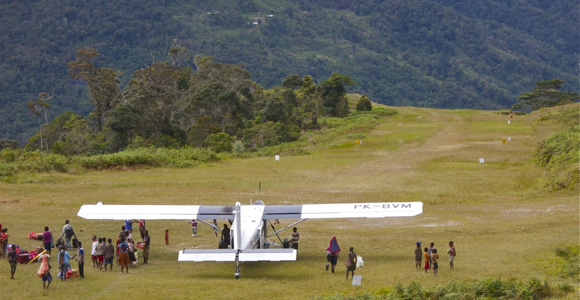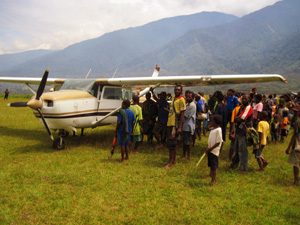While most of Papua New Guinea’s coffee crop is sold in bulk to Europe’s major coffee giants, Paul Howell discovers one American businessman trying to offer the country’s coffee growers an altogether different, ‘aerial’ route to the US market.

Butch Herschman’s Cessna 620 ready for take-off.
It’s a long way from Papua New Guinea’s Highlands to the Washington State Convention Centre in Seattle, USA; but the trip this week could be a lucrative one for Butch Herschman. He’ll be at the Specialty Coffee Association of America’s annual exposition, hoping to introduce what he describes as the world’s best coffee—grown wild in the some of the most remote parts of PNG—to his home country and its millions of sophisticated coffee drinkers.
‘It’s some of the highest quality Arabica coffee you can find anywhere,’ he tells Business Advantage PNG. ‘It’s grown wild, so it’s 100% organic by default, and it has an earth-toned, citrus flavour that connoisseurs of fine coffee love.’
His family-owned company, PNG Highlands Summit Coffee, is just two years old. So, right now at least, Herschman does everything. He is chief investor, pilot, infrastructure specialist, exporter and marketer, all at once. There are challenges at each of those steps, but Herschman is confident the quality of the end product will engineer significant returns for both the company and its remote PNG suppliers.
Pilot project
Herschman first travelled to PNG in 2003, working as a pilot on behalf of a gold buying company. He returned in late 2011 to start his own gold business from Lae.
Logistics were a problem, and Herschman soon invested in his own Cessna 206 bush plane, in order to fly into some of PNG’s most remote highland communities.
‘The villages wanted to get more than their gold to markets; there was also vanilla and this amazing wild-grown coffee,’ he tells Business Advantage PNG.
Remote areas such Asama, Garasa and Wasu had rarely farmed the coffee, as they were unable to transport the produce to local markets. Surrounded by mountains, the only way out is via air, and low local prices made the effort unviable. Herschman says his business model cuts out the middle men, enables faster processing (ensuring more of the product is protected from moisture and rot) and takes advantage of the higher prices available for specialist coffee in developed markets.
‘The product will attract a significant premium among coffee lovers in the US,’ he says.
Broader benefits

Butch Herschman says he has so far helped six villages to build and maintain air strips, with another 16 planned for the coming year.
At the same time, PNG Highlands Summit Coffee has developed vital infrastructure and transport services for what would otherwise be isolated communities. Herschman says he has so far helped six villages to build and maintain air strips, with another 16 planned for the coming year. As well as coffee, the company’s service helps to deliver foreign aid, materials, and even the occasional teacher.
The US coffee market is, Herschman admits, proving hard to crack. Just one or two buyers control the bulk of the market, and it is difficult at this stage to guarantee future supply of the PNG product. But Herschman does have a small following among retailers in his home town of Minneapolis, and hopes this week’s journey will find a buyer with regional, or even national distribution.
Paul Howell is freelance business journalist.









Speak Your Mind